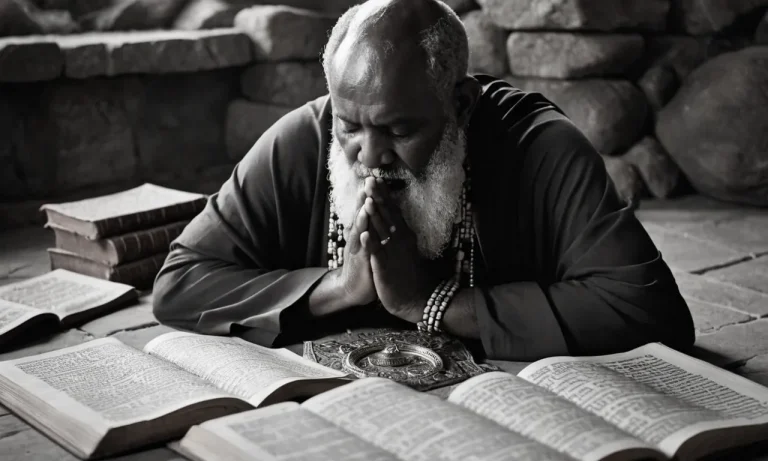God Is Faithful Even When We Are Not
Even in our moments of doubt, despair, and unfaithfulness, God remains true to His promises. His faithfulness supersedes our shortcomings.
If you’re short on time, here’s the key takeaway: Despite our imperfections as humans, God loves us unconditionally and keeps His covenants because His essence is faithful and true.
In this comprehensive guide, we will unpack the biblical and theological support for God’s enduring faithfulness, provide real-life examples of when God remains true in the face of human unfaithfulness, and leave you assured that even when you stumble and stray, His love and loyalty remain steadfast.
Theological Basis for God’s Faithfulness
God’s Faithfulness as Central to His Character
God’s faithfulness is a core aspect of who He is. Throughout Scripture, God reveals Himself as completely trustworthy, steadfast, and faithful to keep His promises (Deuteronomy 7:9). His faithfulness flows out of His immutable, unchanging nature (Malachi 3:6).
Because God does not change, His faithfulness persists regardless of human wavering or unfaithfulness. As The Gospel Coalition notes, “At the heart of the biblical understanding of God’s faithfulness is his covenant with Israel and the church.”
Scriptural Affirmations of God’s Faithfulness
The Bible contains many declarations of God’s enduring faithfulness. In Lamentations 3:22-23, Jeremiah proclaims that God’s “steadfast love never ceases” and “his mercies never come to an end.” The Psalms repeatedly extol God’s faithfulness: “Your steadfast love, O LORD, extends to the heavens, your faithfulness to the clouds” (Psalm 36:5); “I will sing of the steadfast love of the LORD, forever; with my mouth I will make known your faithfulness to all generations” (Psalm 89:1).
Paul praises God’s faithfulness in 1 Corinthians 1:9 – “God is faithful, by whom you were called into the fellowship of his Son.” Because faithfulness is an essential component of who God is, He remains entirely dependable, loyal, and true.
The Covenants as Signposts of God’s Faithfulness
Throughout the Old and New Testaments, God initiates covenants with His people that demonstrate His unwavering faithfulness. Despite human shortcomings and rebellion, God graciously keeps His covenant promises.
The Abrahamic, Mosaic, Davidic, and New Covenants all testify powerfully to God’s enduring faithfulness (Genesis 12:1-3, Exodus 19:5-6, 2 Samuel 7:8-16, Jeremiah 31:31-34). Though God’s people repeatedly break covenant with Him, God mercifully remains faithful, sending prophets to call His people back to fidelity, ultimately becoming incarnate in Christ to perfectly fulfill both sides of the covenant.
God’s covenants reveal that even when His people are faithless, He remains ever faithful.
Case Studies of God’s Faithfulness Despite Human Unfaithfulness
Throughout the Old Testament, God demonstrated amazing faithfulness to Israel despite their frequent rebelling and unfaithfulness. Though they repeatedly turned to idols and rejected God’s commands, He continued to pursue them and draw them back to Himself (Hosea 11:1-4). Here are some examples:
- God miraculously delivered Israel from slavery in Egypt even when they complained and grumbled along the way (Exodus 14:10-12).
- After Israel worshipped the golden calf, God was ready to destroy them, but relented after Moses interceded (Exodus 32:7-14).
- Despite Israel’s unbelief, God provided manna, quail and water for them in the wilderness for 40 years (Exodus 16:1-36).
- Though Israel often neglected God’s laws, He sent prophets like Isaiah and Jeremiah to call them back to obedience.
No matter how many times Israel turned away, God kept pursuing them and calling them back to Himself. He is patient and faithful, even when His people are not.
Jesus’ Faithfulness Despite Disloyal Followers
Jesus demonstrated incredible loyalty and commitment to His followers, even when they failed Him. For example:
- Jesus washed His disciples feet, including those who would abandon Him (John 13:1-17).
- Jesus predicted Peter would deny Him 3 times, but restored him after the resurrection (Matthew 26:31-35).
- Judas betrayed Jesus with a kiss, yet He still called Judas “friend” (Matthew 26:50).
- The disciples fled when Jesus was arrested, yet He forgave them and appeared to them after His resurrection (Mark 14:50-52).
Despite being abandoned and denied, Jesus never disowned His followers. He modeled perfect faithfulness, loving others even when the love is not reciprocated.
God’s Restoration of Peter After His Denials
One of the most powerful examples of God’s faithful love is His restoration of Peter. After boldly proclaiming he would never deny Christ, Peter did exactly that three times during Jesus’ trial (Luke 22:54-62). Undoubtedly, Peter felt deep shame and regret.
But Jesus lovingly recommissioned Peter to “feed my sheep” (John 21:15-19), restoring their relationship. God’s forgiveness made Peter an even bolder preacher of the Gospel (Acts 2:14-41). This demonstrates that no matter how badly we mess up, God is faithful to forgive, restore and redeem us when we repent.
The Implications of God’s Unconditional Faithfulness
We Can Have Full Assurance in God’s Promises
God’s faithfulness means we can trust completely in His promises. Even when we are faithless, God remains faithful (2 Timothy 2:13). He will never break His covenant or go back on His word (Psalm 89:34). This gives us incredible assurance and confidence.
We don’t have to worry about being let down by God. His track record is perfect – He has fulfilled every single promise He has made throughout history. Just look at examples like the virgin birth of Jesus (Luke 1:26-38), the birth of Isaac to Abraham and Sarah in their old age (Genesis 21:1-7), the Exodus from Egypt (Exodus 14), and countless more.
God is totally and completely reliable.
Knowing this, we can cling to God’s promises when we face trials and difficulties. We can believe wholeheartedly that He will give us the strength to endure (1 Corinthians 10:13), work all things for our good (Romans 8:28), never leave us nor forsake us (Hebrews 13:5), forgive us when we confess our sins (1 John 1:9), and one day welcome us into His presence forever (John 14:3).
Even when our emotions vacillate, God’s faithfulness anchors us in truth.
We Are Empowered to Get Back Up When We Fall
Another beautiful implication of God’s unconditional faithfulness is that we can always turn back to Him, no matter how many times we mess up. God doesn’t keep a record of wrongs (1 Corinthians 13:5). His mercies are new every morning (Lamentations 3:22-23).
He is waiting patiently for His prodigal children to return so He can run out to meet them (Luke 15:11-24).
Knowing this empowers us to get back up and try again when we stumble. We serve a God of second chances. He forgives generously. His grace is abundant. We cannot exhaust His patience. This truth has inspired and motivated countless followers of Christ to turn their lives around after years of running from God.
Like the apostle Paul, the most ruthless persecutor of the early church transformed into its most zealous advocate and missionary. Our mess-ups are never stronger than God’s faithfulness.
We Should Likewise Strive for Faithfulness
Since we are made in the image of God (Genesis 1:27), we too should aspire to be faithful – faithful to God first and foremost, but also faithful in our other relationships and responsibilities. Our faithfulness flows out of beholding God’s faithfulness.
As we get to know Him more intimately, we become more like Him (2 Corinthians 3:18).
Practically speaking, faithfulness means being consistent in things like prayer, Bible reading, fellowship, giving, serving, and sharing our faith. It means keeping our word and sticking to our commitments even when it’s hard.
Faithfulness breeds trust in our marriages, families, friendships, workplaces, and churches. It opens doors for greater Kingdom impact (Matthew 25:21).
Of course, living faithfully is impossible without God’s strength. We can only be faithful inasmuch as we rely on Him and walk in step with His Spirit. Our fallen nature tends toward unfaithfulness. But by God’s grace, we can reflect His faithfulness more and more each day.
And when we do stumble, His faithfulness remains unchanged, ready to pick us back up and set us on the right path once more.
Conclusion
As we have explored, even if we falter, rebel, doubt or deny, God perseveres in faithfulness towards us. His promises remain yes and amen. His love is unfailing. His covenants stand secure. And by the power of the Spirit, He equips us to grow in faithfulness too as we rest in His.








